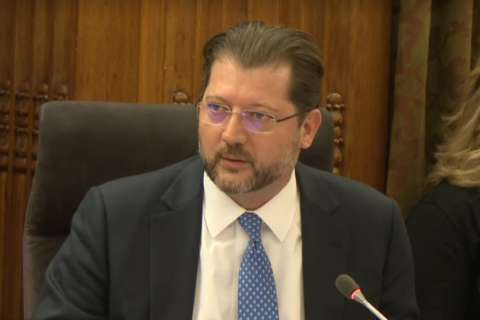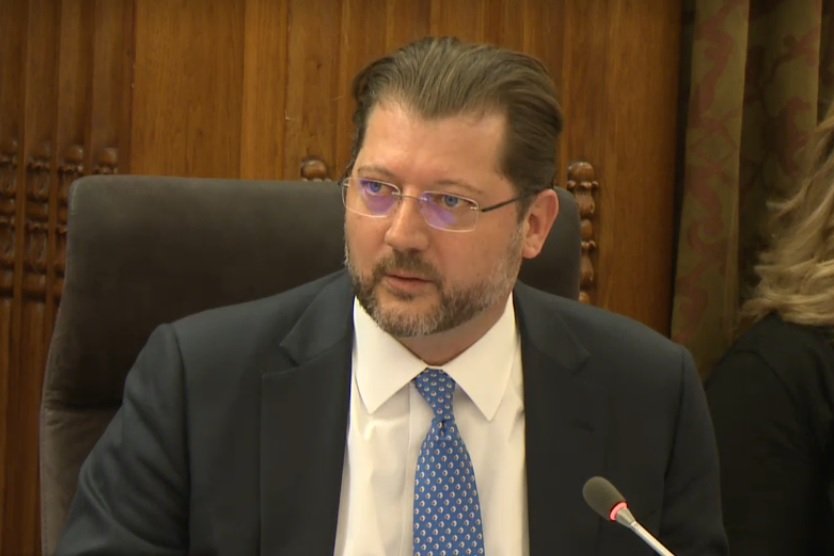
Some members of the D.C. Council are again raising questions about Intralot and the gaming company’s ties to others with political connections in the city as it debates approval of a sports betting contract between the D.C. Lottery and Intralot.
At stake is the city’s path to sports betting, which had been slated to go live next month after the council legalized it last year, as well as the scratch-off games and other aspects of the lottery that are part of a massive contract up for debate in the council.
The final debate on the contract is slated for July 9, but at a D.C. Council hearing Wednesday, city lawmakers expressed skepticism about Intralot as well as the process that’s played out to this point.
At-large Councilman David Grosso started off by casting doubts on the urgency behind giving Intralot, which is the city’s vendor for lottery games, a no-bid deal to set up the infrastructure to run the city’s sports gaming operation.
Originally, it was to capitalize on the more methodical approaches being taken in Virginia and Maryland. While both states have talked about legalizing sports betting, only Maryland currently has any casino gaming, and the earliest sports betting could go online there would be following a referendum vote in November 2020.
“The council was also urged to sole-source the contract with the coincidentally soon-to-expire lottery contractor, Intralot, in order to avoid a lengthy and costly delay of full implementation and to avoid contract protests,” said Grosso.
“All of this urgency, of course, was informed by a report compiled with a vendor who lists Intralot as one of their clients.”
Grosso also raised doubts about Intralot, noting its credit rating has been downgraded three times since last September “in part due to limited historic growth track record, substantial cash leakage and potential for under performance of the core businesses in 2019 and 2020. We don’t even have a complete picture of Intralot’s financial woes … because Intralot wants to keep that information a secret.”
The hearing also gave Grosso a chance to again question the political process that has played out behind the scenes, reminding the council that he had concerns about a “spike” in political contributions just as contracts are starting to run out.
“Now we see a contract before us containing subcontractors with even more significant political connections and poor track records, such as Life Deeds, which was ousted from operating a homeless shelter due to falsifying documentation,” he said.
“Yet we don’t know what the subcontractors’ scopes of work will be or how much they’ll be paid because it’s been withheld from the public. This still reeks of pay-to-play, even more now than before.”
Grosso’s critiques were followed up with more criticism from colleagues on the council included Robert White, Elissa Silverman and Vince Gray. But embattled Councilman Jack Evans spoke up in favor of the single source contract, saying it has the backing of the city’s chief financial officer, who called it a good deal.
“The council exempted the lottery from a drawn out procurement process in February so that the District could move more quickly to capitalize on this revenue,” argued Evans. “If the contract is not approved, the District will not only lose our provider of sports wagering services, but all lottery services entirely. So we will have no one to run the current lottery with the scratch offs, et cetera et cetera, nor will we have anyone to run the sports wagering.”
“It will have an impact, because in the budget we just passed, there are funds that are anticipated to be collected from the lottery that will no longer be collected, so we’ll have to revisit our budget and fill that hole,” Evans said.
During the hearing, D.C. Council Chairman Phil Mendelson suggested Evans may have to recuse himself from voting on the lottery contract because of an ongoing federal corruption investigation.
Later in the hearing, the city heard testimony from Beth Bresnahan, the director of the D.C. Lottery, who said the delays have already led to downward revisions of the estimated amount of revenue sports betting would generate.
She blamed the prolonged process of approving the contract for the lowered revenue estimates and said that, at this point, even if the council approves the contract next month, it’s unlikely there would be any betting in the city before January of 2020.









